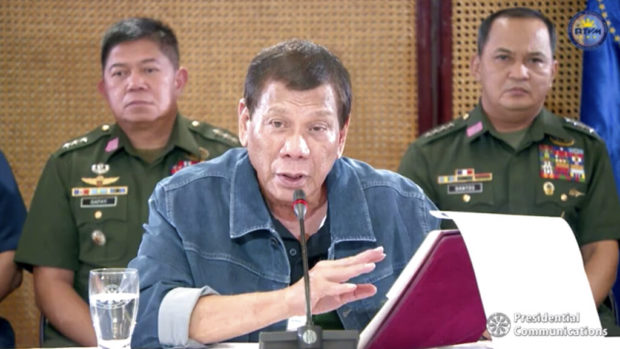
President Duterte has suspended domestic travel to and from the Manila area for a month and authorized sweeping quarantines in the region to fight the new COVID-19 coronavirus. (RTVM via AP)
Update
MANILA, Philippines — President Rodrigo Duterte has approved the imposition of a “community quarantine” in the entire Metro Manila as the government scrambles to contain the spread of the 2019 coronavirus disease (COVID-19) in the country.
The recommendation to put the National Capital Region (NCR) under isolation was made by the Inter-Agency Task Force for the Management of Emerging Infectious Diseases and was approved by Duterte in a meeting in Malacañang Thursday night.
Land, domestic air, and domestic sea travel to and from Metro Manila will be suspended starting March 15, 2020, until April 14.
“Ayaw naming gamitin ‘yan kasi takot kayo sabihin niyo ‘lockdown’ (We don’t want to use the term lockdown because it intimidates you). But it’s a lockdown. There’s no struggle of power here, walang giyera. It’s a matter of protecting and defending you from COVID-19,” Duterte said.
“It has nothing to do with the power of the police or the military or my power … it’s just an issue of protecting public interest and public health,” he added.
With police and military generals sitting behind him, Duterte warned that violators and officials who refuse to enforce the temporary restrictions will face arrest and possible imprisonment.
“This is not martial law. It’s not even something extraordinary,” Duterte said.
But he warned that “if things deteriorate, the military and police will maintain order.”
The actions will be reviewed daily by an inter-agency force dealing with the viral outbreak, Duterte said.
“This is not a total lockdown,” Interior Secretary Eduardo Ano said, suggesting that law enforcers would be considerate.
Meanwhile, local government units outside Metro Manila are advised to follow the following guidelines in imposing localized community quarantine in their respective jurisdictions:
- A barangay-wide quarantine when there are at least two COVID-19 cases belonging to different households in the same barangay
- A municipality/city-wide quarantine when there are at least two COVID-19 cases belonging to different barangays in the same municipality/city
- A province-wide quarantine when there are at least two COVID-19 cases belonging to different municipalities, component cities or independent component cities in the same province.
- LGUs which have imposed community quarantine will be allowed to access their Quick Response Fund upon declaration of a State of Calamity
Overseas Filipino workers under the Balik Manggagawa Program will be allowed to travel to mainland China, except to Hubei Province, the epicenter of the COVID-19 pandemic. However, they will be asked to accomplish a Declaration signifying their knowledge and understanding of the risks involved in their travel.
Entry travel restrictions, meanwhile, will be imposed on travelers traveling from countries with localized COVID-19 transmissions, except for Filipino citizens including their foreign spouse and children, if any, holders of permanent resident visa, and holders of diplomatic visas issued by the Philippine Government.
The President also banned mass gatherings or the “planned or spontaneous event where the number of people attending could strain the planning and response resources of the community hosting the event.”
To date, the Philippines has 52 confirmed cases of COVID-19, a respiratory disease caused by the novel coronavirus that first emerged in China’s city of Wuhan in Hubei province in late 2019.
A vast majority of the confirmed cases were admitted to different hospitals across the capital region.
The World Health Organization now considers COVID-19 a pandemic.
Leaders warn viral pandemic will worsen
People around the world became increasingly closed off from one another Thursday as sweeping travel bans accelerated, walling regions apart as a viral pandemic unfolds and financial markets plunge.
It was an outbreak moving, at once, both glacially and explosively, with a virus first detected three months ago in China creeping across borders and producing eruptive outbreaks that have crippled areas.
Even for a crisis that has brought no shortage of headlines, dizzying developments were flashing across screens: An official designation of “pandemic” from the World Health Organization, a dramatic halt to much travel between the United States and 26 European countries, and infections among beloved Hollywood stars, sports luminaries and political leaders. All of it came against a backdrop of plunging world economies that left not only Wall Street investors but people from all walks of life hurting.

